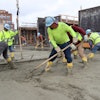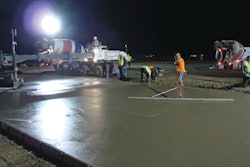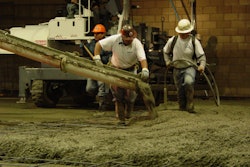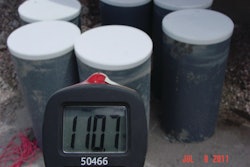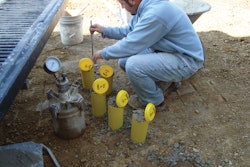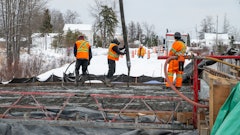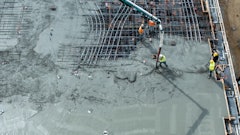Tools help you solve problems and complete the job in a timely manner. We wanted to find out if there were a specific set of tools that the concrete polisher couldn’t live without. What we discovered is there isn’t one particular tool that is needed. In fact, all of your tools are important. Here is a sampling of the responses we received.
Jay Barstow, Technical Director at Aeroflor Coating Services: “A trusted, knowledgable employee! Contracting is too difficult to have your tools walk around on two legs!”
“A toolbox full of drill bits, a hack saw, wrenches, screwdrivers, allen wrenches, razor blades, electrical testing equipment, teflon tape, wire nuts, plugs, PCDs', various diamonds, WD-40, hose ends, and washers. You can have the best machines in the world, but when (not if) they break, you gotta' get them back in the running like the pit crews do at Nascar.”
Marc Alicea, Owner – TCM Waterproofing, LLC: “Amen: Jay. This is a loaded question because you have to remember that ‘processed polished concrete’ is like cooking the perfect meal of any kind. It requires the very best ingredients proper heat from grill or stove and a skilled knowledgeable cook/chef who also has excellent set of taste buds in their food preparation.
Knowing how to get full flavor from a steak without over cooking it, (proper seasoning to sauces) seafood without over cooking it. Like calamari or lobster for example: if overcooked it's like chewing on rubber. Not mentioned eye for detail in proper presentation of their dish they just created. Let's not forget trusted line cook's prep chef's back of the house cleaning crews and polished wait staff with great management and hostess to pull off the ultimate dining experience that there customers can have.
Man all this talk about food is making me hungry.”
William Brown, CEO at Bill Brown Construction Company: “If it came down to the one tool in my tool box that I use every day, many times per day, it would be my 5-in-1 scraper. I use it to remove resin pucks from my velcro backing pads, chase cracks prior to installing epoxy filler, scrape various stuff out of corners, and it is useful for a quick scratch test for hardness if you don't have your test kit. It has a screw driver, a box wrench, cutter, and a scraper.
When it is misplaced, I have to find one or all of those items, losing precious time.”
Mike Boeddeker, Pristine Concrete, a Architectural Concrete Company: “Reputation, image, website, your brand! Without this you have no leads. No leads, no jobs. You need jobs for all of the above. May we all have an abundance of leads. Charge on!”
John Cernava, Owner, Valley Flooring Inc.: “I seem to always have a sprayer for water and densifier etc. but mostly we can't live without misting the floor when the concrete is hard or we need more aggressive cutting etc.”
Dave Moore, Mark Beamish Waterproofing: “I can't live without my knee pads because you can polish concrete with a stone on your knees if that's all you have as the ancient Venetian's did for 2000 years. I wonder how they protected their knees. Knees are important for walking.”
Peter Wagner, Managing Director, Wagner Innovations / Concrete Flooring Solutions: “Patience, honesty, the willingness to ask other's for help if you don't know something, the willingness and intelligence to walk away from a project, and a good documentation program like my PhotoFlow Project Management System which includes the use of Apps/smartphones and tablets to document the project from the day you bid, throughout the entire process, all the way to presenting the customer with their own personalized photo essay of the work you performed for the . . . and at the same time they're handing a a check, along with "Thanks for a job well done!"
John Jackson, Historic Marble and Terrazzo Restoration: “Well I am 58 and I couldn't live without my racatac. It’s a rolling set of kneepads with a bicycle seat and chest support....cuts edging time down by one-third, or at least it seems that way. By far my favorite tool!”
Robert Holmes, President at Master Applications, Inc.: “Taking our time on the first cut. Also my line of Diamatic 780 RS grinders.”
Michael Lucky, concrete griding and polishing: “I find that the most important tool in my box is the one I need at the time. This will change with every job. As in every response previous , it’s all and more. It’s be prepared.”
Charlie Dickinson, Technical Sales Rep at Dustcontrol Inc.: “Great employees need to be at the top of the list! If you don't have good employees your business can only grow so much, no matter the field of work.”
Roy Bowman, Owner, Concrete Visions, Inc.: “Knowledge. Knowledge about every aspect of this trade. Knowledge about the customer’s expectations. Knowledge about industry trends, good or bad. Knowledge about the products, how they work and do they really preform as advertised. Knowledge about your equipment and tooling. Knowledge about the concrete itself - mix design, curing method, etc. Knowledge on how to achieve what the customer has asked for.
The more knowledge you have, probably the less competitive you will be on pricing, but you are likely to be a great polisher who doesn't have to low ball a job to get it.”
David Padgett, President at CPS (Concrete Polishing Solutions): “A straightedge comes to mind. Trying to communicate the need for a well-placed, well finished, well consolidated, flat concrete slab to the design team as well as the construction team is many times as simple as a straightedge and a group walkabout on the jobsite. I have used a straightedge in this way to help polishing contractors collect on checks and recover relationships with customers numerous times with several of these disputes in the seven figures. It’s hard to argue with your own eyes up close and a straightedge that is clearly demonstrating a pre-existing concrete condition. In the right situation a simple tool like this is the only tool for the job.”
Lee Gibson, President at Bay Equipment Co.: “We've started adding multi-meters to our rental units and developing a troubleshooting checklist and video for power issues. It's amazing how quickly you can lose an hour of production because the electrician turned the mains off the night before and you're scratching your head wondering why your machine won't turn on the following morning.”
Craig Walton, Owner at Iron Horse Machine Works LLC: “Lee, I like your approach. Over the years power problems are probably one of the most calls I get. I personally know several contractors who have hooked up 240-volt machines to 480-volt power, or had an unbalanced power system on a generator and burned up the frequency drive to their machines. Having and knowing how to use a multi-meter is a must in my book as well.”
Sam Godbey, Operations Manager at Artistic Surfaces: “Duct tape...”
Jay Barstow, Technical Director at AeroFlor Coating Services: “I've read a lot of good stuff here, but in a nutshell I think the most important tool is between the ears ... a combination of passion, curiosity, and experience. Passion and curiosity fuel a drive to learn and excel. Experience provides the vehicle to get there.
One thing I need to comment on is possibly generational. In my day mechanical skills came with the territory, we were always taking things apart and putting them together again ... sometimes successfully, sometimes not. Repair, not replace, was the rule of the day. That allowed me to to gain the electrical and mechanical skills that have served me so well. Later generations are proficient with a keyboard (got my first computer in the 80s), but don't seem to have the same innate mechanical "feel" for torque, gasket compound, and voltage.”
John Kazalonis, Aspiring Independent Business Owner at Independent Contractor/Consultant: “My glib answer: my handshake. It opens doors, closes deals, confirms honesty and integrity, and provides connection. Tool? Not mentioned yet, probably because they are relatively expensive and not used much (yet), but soon to become indispensable is a gloss/reflectance meter.”
Bob Lattimore, Business Development: “I like all the answers above - thank you for sharing - I personally feel there are way too many important physical tools to single out just one as the most important. Then there are the mental tools - brains, education, pride in product/end results - setting proper/obtainable expectations, preparing correctly for job, and a positive attitude.”
To see more of this discussion and others, go to our LinkedIn group – “Concrete Polishing”. Requst to join and participate. You may learn something from your fellow concrete polishers.


